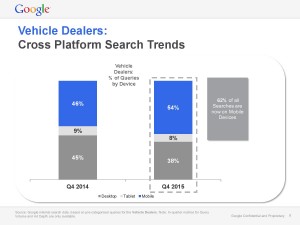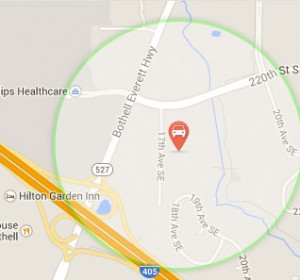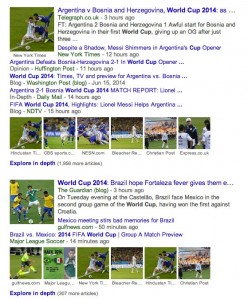Posted:
Friday, February 19, 2016
Tags:
Ads, Advertisements, facebook, facebook ads, in-market, ppc
Facebook Ads For Car Dealerships
How Car Dealers Can Target In-Market Car Shoppers Using Facebook
 In the Fourth Quarter of 2015 Facebook had $5.6 billion in ad revenue. Mobile advertising made up a huge portion of their revenue, accounting for 80% of it. If you want to reach out to your customers on mobile devices then Facebook advertising needs to be a part of your dealership’s digital marketing strategy. There are multiple ways you can target your ads in Facebook. You can set up a custom audience (Facebook’s version of retargeting), demographic targeting, financial resources, interest-based targeting and in-market targeting. In this post we’re going to be discussing Facebook’s In-Market targeting capabilities and how it can be utilized by your dealership.
In the Fourth Quarter of 2015 Facebook had $5.6 billion in ad revenue. Mobile advertising made up a huge portion of their revenue, accounting for 80% of it. If you want to reach out to your customers on mobile devices then Facebook advertising needs to be a part of your dealership’s digital marketing strategy. There are multiple ways you can target your ads in Facebook. You can set up a custom audience (Facebook’s version of retargeting), demographic targeting, financial resources, interest-based targeting and in-market targeting. In this post we’re going to be discussing Facebook’s In-Market targeting capabilities and how it can be utilized by your dealership.
What Is Facebook In-Market Targeting?
Our online behavior says a lot about our buying intentions. Utilizing data from a variety of sources that may include websites you’ve visited, Facebook is able to tell who is in process or considering buying a specific product. This is a powerful digital marketing tool that will allow you to show ads to people who is interested in or actively looking for your specific product.
How Dealerships Can Utilize In-Market Audience in Facebook
Facebook behavior targeting allows you to target people in-market for specific vehicle brands such as Honda, Toyota, Chevrolet or Ford. You can even target people who are in-market for certain vehicle types such as SUVs or trucks. Below is a table showing the potential reach for various in-market target audiences within a 30 mile radius around the Seattle market.
|
30 miles around Seattle |
||
| Facebook Audience | Potential Reach | |
|
Branded |
In Market Ford |
39,000 |
| In Market Honda |
95,000 |
|
| In Market Chevrolet |
27,000 |
|
| In Market Toyota |
140,000 |
|
| In Market Hyundai |
21,000 |
|
| In Market Kia |
21,000 |
|
| In Market Subaru |
51,000 |
|
| In Market Dodge |
13,000 |
|
| In Market Dodge Ram |
42,000 |
|
| In Market Jeep |
25,000 |
|
| In Market Mazda |
22,000 |
|
| In Market Volkswagen |
28,000 |
|
| In Market Nissan |
38,000 |
|
| In Market Audi |
13,000 |
|
| In Market Mercedes |
15,000 |
|
| In Market Cadillac |
8,400 |
|
| In Market Chrysler |
98,000 |
|
| In Market Lexus |
19,000 |
|
| In Market Acura |
18,000 |
|
| In Market Infiniti |
6,600 |
|
| In Market BMW |
19,000 |
|
| In Market GMC |
21,000 |
|
|
Off Brand (New) |
In Market Luxury SUV |
110,000 |
| In Market Midsize Car |
210,000 |
|
| In Market Pickup Truck |
220,000 |
|
| In Market Compact Car |
290,000 |
|
| In Market Convertible |
35,000 |
|
| In Market SUV |
180,000 |
|
There are multiple ways a dealer can utilize in-market audiences to target potential car shoppers. Here are some potential ideas:
Target Competing Brands. Show your ads to people interesting in competing brands to try to sway them into your sales funnel. Example: A Honda dealership could target ads to people who are in-market for Ford, Hyundai, or Kia cars.
Combine In-Market Audience for competing brands with people who have liked your page. As a dealership brand loyalty plays a big part in your bottom line. You don’t want past customers to switch over to a different car brand when it’s time for them to get a new car. By targeting people who have liked your page with In-Market competing brands you can target past customers who may be thinking of jumping ship from your brand.
Target your own brand. This one is rather straight forward. Target people who are actually interested in your product.
Target In-Market off brand interest. Target high sales funnel shoppers who are interested in a specific type of vehicle, but haven’t quite decided which brand yet.
These are only just a few ideas to get you started in targeting potential car shoppers using in-market Facebook audiences. It’ll definitely get you started in the right track in targeting the right people with your Facebook ad campaign.






 Car dealerships can use Callout extensions to promote special offers, price matching guarantees, award-winning customer service, and more. You can easily add Callout extensions at the campaign and ad group level and even schedule the dates that they’ll run. On the campaign level you can add general Callout extensions that highlight your award-winning sales staff or your no hassle sales policy. On the ad group level you can get more specific and highlight special promotion and offers for specific vehicles. Is your dealership running a 0.9% APR on 2014 car models until the end of the month? If so, that’s a perfect opportunity to use Callout extensions.
Car dealerships can use Callout extensions to promote special offers, price matching guarantees, award-winning customer service, and more. You can easily add Callout extensions at the campaign and ad group level and even schedule the dates that they’ll run. On the campaign level you can add general Callout extensions that highlight your award-winning sales staff or your no hassle sales policy. On the ad group level you can get more specific and highlight special promotion and offers for specific vehicles. Is your dealership running a 0.9% APR on 2014 car models until the end of the month? If so, that’s a perfect opportunity to use Callout extensions.
